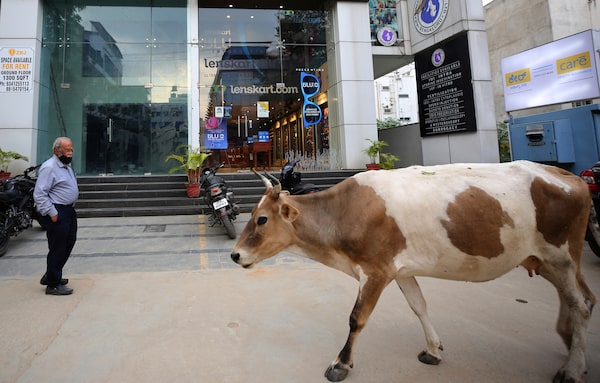
A cow walks past an empty store, left, which housed a famous jewelry brand before vacating the premises recently in Bengaluru, India on Oct. 8, 2020.Aijaz Rahi/The Associated Press
For the first time, India’s National Cow Commission will hold a “cow science examination,” meant to “infuse the curiosity into all Indians about the cows, and make them aware of the unexplored potential and business opportunities a cow can offer.” Aimed at students and the general public, the one-hour test will be conducted online Feb. 25 in four categories, in English and regional languages.
The announcement, made on Jan. 5, has outraged experts across the country, including scientists, educators and academics who question not just the motive behind it, but the syllabus provided by the commission to help participants prepare.
According to the reading material, the colour of the native cow’s milk is light yellow because it has traces of gold in it, and animal slaughter causes earthquakes. Another controversial part outlines the differences between native and Jersey and Holstein-Friesians cows, calling Indian cows “hygienic, hardy and clever enough not to sit at dirty places,” while “Jersey cows are known to be very lazy and highly prone to diseases.”
The 54-page syllabus begins with a detailed description of the importance of the cow in Hindu scriptures, extolling the animal’s religious, spiritual and medicinal significance. It states that “a society based on the religious principles of cow protection and ox power can solve all the problems of the modern world, among them pollution, crime, poverty, unemployment, war, famine, hunger, disease, floods, global warming, deforestation.”
“The entire exercise is ridiculous,” said Aniket Sule, associate professor at Homi Bhabha Centre for Science Education in Mumbai. “It’s peddling pseudo science. Take a claim like traces of gold in cow’s milk – no animal can convert one element to another. The only way you’d find any is if the animal has consumed it through the local soil that may have gold in tiny amounts.”
But Vallabh Kathiria, chairman of the National Cow Commission, set up by the central government two years ago, is undeterred. “The literature we have put together is based on more than 100 books on cows, research papers and religious scriptures,” he said, adding that so far they have received 25,000 registrations, including participants from 15 other countries. “We are in the process of alerting schools and colleges across states about it.”
When asked about the lack of citations to evidence backing the claims, he said: “Our statements are based on research papers, and those who don’t believe them can come forward and take up the challenge to conduct more studies.”
His sentiment is one shared by millions of Hindus, who consider the cow sacred and believe that its products – such as milk, curd, ghee, urine and dung – have medicinal properties. Increasingly, the cow has become a symbol of fervent nationalism, underlined by the rise of “cow protection” groups who go after those suspected of transporting and selling cows for slaughter. Twenty states in India have a beef ban, meaning cow slaughter is not permitted.
It is worrisome that the cow has become a political project, this time through education at the cost of rational thinking, said Sagari Ramdas, a veterinarian and bovine economy expert based in Hyderabad. She is “horrified it has the backing of very senior veterinary scientists,” who are part of the commission. “It contradicts the oath we take, which is to use our scientific knowledge and skills to benefit all animals. ... Indigenous breeds of cows are amazing but that has nothing to do with the holiness and spirituality of the cow.”
Jayant Murthy, a professor at the Indian Institute of Astrophysics, expressed similar concerns. He is one of 500 scientists who petitioned the Department of Science and Technology last year to cancel a call for proposals from scientists to research indigenous cows, calling it “a waste of taxpayer money.”
“The shame is that this is essentially sponsored by the government, which has sworn to uphold scientific temper,” he said. “... Our students, who are trained to not question, will go on to their careers with a belief in magic rather than science and technology.”
Mr. Kathiria sees the test as a stepping stone to a larger plan. “With the exam, we hope to sensitize people and, along with schemes and incentives, encourage them to boost the rural economy and keep more cows,” he said. “People should know about cow science right from childhood. Everyone wants to study engineering, but the cow industry is not explored enough. We might make it an annual event. Study centres dedicated to research on cows have already being set up in universities across the country.”
In October, he revealed a chip made of cow dung that he said reduces radiation from cellphones. The claim has recently been refuted by the Breakthrough Science Society, a body of scientists and researchers that analyzed the experiment and said it violates all norms of scientific procedure. In January, another government department released paint containing cow dung that it touted as being more eco-friendly and having anti-bacterial properties.
Though participation in the exam is voluntary, Mr. Sule has misgivings about participation. “My concern is that a commission that has government recognition will try to get maximum participation from children, and will be mistaken for a compulsory exercise,” he said. “So the effect will be that children will just mug up the material which will impact the overall level of scientific thinking in the country.”
Both Mr. Sule and Ms. Ramdas said that in academic circles, other educators have been wary of publicly boycotting the exam as they are dependent on government funding.
Added Ms. Ramdas: “It is an indoctrination of generations of students, to accept ‘karma’ as ‘science,’ and not question, even as we talk about advancement.”
Our Morning Update and Evening Update newsletters are written by Globe editors, giving you a concise summary of the day’s most important headlines. Sign up today.